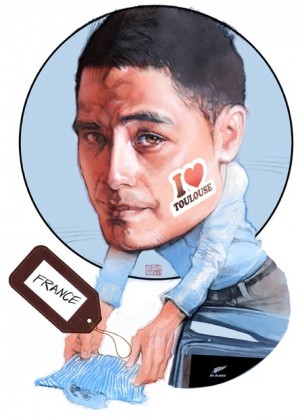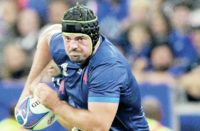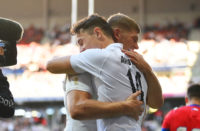 The suggestion that Aaron Smith, the New Zealand scrum-half, has been sounded out by Toulouse about joining the French club after the 2015 World Cup has set Kiwi nerves on edge. This probably explains why an overseas journalist who attempted to broach the subject with Smith at an All Blacks Press conference last week was told forcefully by the team's media minders that the scrum-half and the subject of Top 14 transfers were out of bounds.
The suggestion that Aaron Smith, the New Zealand scrum-half, has been sounded out by Toulouse about joining the French club after the 2015 World Cup has set Kiwi nerves on edge. This probably explains why an overseas journalist who attempted to broach the subject with Smith at an All Blacks Press conference last week was told forcefully by the team's media minders that the scrum-half and the subject of Top 14 transfers were out of bounds.
The RFU have already flagged up their concern that there could be an England exodus to the cash-rich Top 14 with Ian Ritchie, their chief executive, saying the Union accept they will have to reach deep into the purse to keep star Red Rose players in the Premiership.
However, the danger for New Zealand is far more acute, with the fear that half the All Blacks squad is being lined up by Top 14 clubs whose purchasing power means they are offering contracts which are double the salaries that the NZRFU can muster.
The numbers game is stacked against the New Zealand Union much more heavily than it was before and after the 2011 World Cup when they managed to sign up their marquee stars, with captain Richie McCaw and fly-half Dan Carter in the vanguard. This involved big salary increases and promises of lucrative overseas sabbaticals, which in Carter's case saw him parachute into Perpignan for a handful of matches in 2009.
However, even the latest NZRFU salary increase, which in 2013 saw their top end stars get an earnings boost to c. £325,000 a year from combined Super 15 and All Blacks contracts, is dwarfed by the salaries being touted by Top 14 clubs following their massive broadcast deal with Canal Plus.
It has been well documented that leading Top 14 earners such as Irish fly-half Jonathan Sexton, on £600,000 at Racing Metro, and Jonny Wilkinson, who retired this season on a salary in excess of £550,000, were paid those sums before the new French broadcast deal was struck. Since it was concluded earlier this year the huge financial carrot now being dangled in front of overseas stars by the French clubs is unrivalled anywhere on the rugby planet.
 There is little doubt that a Top 14 contract for a marquee All Black signing could now stretch to £700,000 or upwards, and with the physical demands of the sport increasing year-on-year the temptation for players to cash-in is greater than it has ever been.
There is little doubt that a Top 14 contract for a marquee All Black signing could now stretch to £700,000 or upwards, and with the physical demands of the sport increasing year-on-year the temptation for players to cash-in is greater than it has ever been.
That is why the New Zealand Union fear an exodus to Europe – and even Japan – after the 2015 World Cup which could leave them without half of their best players. In turn, that has serious implications for the competitiveness of the side and the subsequent damage that could be done to the All Black brand. It is a brand which has been built almost entirely on being the most dominant team in international rugby, and the prospect of that being undermined now looms large.
There is a way forward which involves the change being managed, but it would mean the NZ Union grasping the nettle and subcontracting their All Blacks to European clubs for the two years immediately after World Cups. It would include the proviso that they are released for all IRB international windows, and also pre-arranged training camps outside that.
When the two-year European period is up they returned to New Zealand and revert to Super 15/NZ contracts in the two years leading into the next World Cup.
So far, there is no hint that the New Zealand Union are ready to contemplate such a radical move in order to combat the huge shift in market forces. Instead, the main Kiwi focus appears to be on the French and English clubs as the enemy threatening to overthrow the established international order.
New Zealand's predicament is bound to evoke sympathy in some quarters. However, it should not be forgotten that when the game went professional in 1995, the Southern Hemisphere alliance, with the NZRFU to the fore, had their ducks in a row in terms of being prepared for what was then a huge shift in market forces, whereas other Unions, especially in Europe, were unprepared.
With the SANZAR agreement, and their new tournaments underpinned by a groundbreaking broadcast deal with Rupert Murdoch's News Corporation, the New Zealand Union was well set. The attitude in the Southern Hemisphere at the time was ‘we're all right Jack' – and if the rapid transition to professionalism left Northern Hemisphere rugby in a mess, so be it.
Now, almost 20 years on, European rugby has sorted out its structure – and, where market forces are concerned, the boot is on the other foot. Especially, the French foot.



























Pingback: เพิ่มยอดวิว